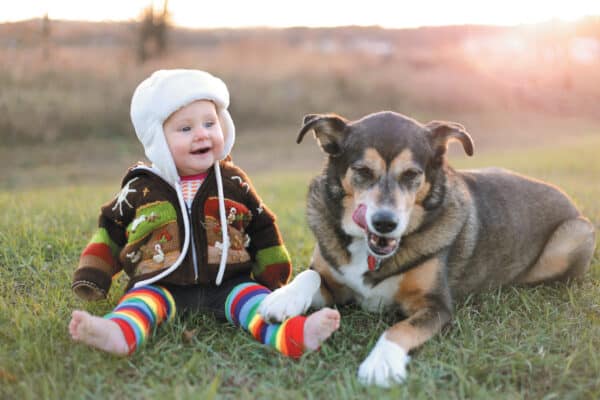Awww, puppies! So cute, so soft, so … annoying! Yes, puppies are adorable, but with their demanding training needs, love of chewing and oh-so-many pre-dawn potty trips outside, they may not be the best choice for you. Instead, consider an adult dog for your next furry family member.
“We encourage everyone thinking about dog adoption to consider their personality and lifestyle, along with challenges such as housing restrictions and amount of time spent at home to determine what pet is best for you and your family,” says Rena Lafaille, administrative manager of the ASPCA Adoption Center in New York City.
If your weekends are more Netflix and less hiking, a puppy may be overwhelming. “For people who are not active, puppies can be exhausting,” cautions Cheryl Yoshioka, founder and president of My Way Home Dog Rescue in Sandy, Oregon.
Puppies may present special challenges to those less physically strong, too. Age can be a factor for those walks — on both ends of the leash. “If Grandpa is out walking a puppy and it spots a squirrel, Grandpa had better be pretty strong or he’ll end up with a broken hip after the dog pulls him down,” says Kim Skarritt-Nelson, founder and president of Silver Muzzle Cottage, a rescue and hospice for homeless senior dogs, based in Rapid City, Michigan.
Benefits of old dogs

“When you adopt an adult dog, you know from the start what you are getting,” says Sarah Javier, president and executive director of the Animal Protective Association of Missouri (APA), in St. Louis. “Their size and physical appearance are fully developed, and for the most part, their temperament is established. We often see pets in the shelter that have some basic skills training. Those that don’t are often eager to learn and respond well to positive reinforcement.”
Another bonus? An adult bladder! “In many cases they are already accustomed to taking care of bathroom business outside,” Sarah says. “And for those who work, adult dogs are able to go for lengthy periods of time between bathroom breaks.” Many old dogs in shelters also have a history of living with a family and may settle in more quickly than a puppy, Rena says. And that may be helpful if your household already has human or furry kids.
Additionally, if you adopt a dog that’s been in a foster home, you also know how they do in a home environment. “You know if they are good with other dogs, good with cats, good in the car,” Cheryl adds. Of course, even an already well-trained adult dog will need time to settle in to your home and family. But you may enjoy more cuddles and less puddles.
Two major concerns people have about getting an older dog is the perceived costs and shorter time to spend together. “Adopters should always plan to spend more when dogs age simply because there may be medications required for arthritis and such, typically ‘old dog’ ailments,” Kim says. “However, puppies can also cost their owners an arm and a leg.” This could be from eating something he shouldn’t to breaking a bone. “It is also important to remember that life span is never guaranteed,” Sarah says. “That sweet puppy could develop health issues at a young age and that older dog could live to be 15.”
You may experience unexpected emotional benefits when adopting an adult. “When you adopt an older dog — especially one that may not have had a great life — you know that you have a ‘mission’ to make sure that he/she has the best life for whatever time they have left,” Kim says.
You may find, too, that old dogs will return that love even more. “Adult dogs are amazing companions right off the bat,” Cheryl says. “Most of the dogs have known love and lost it. They appreciate you.”
Mix it up!
Dogs of all kinds are looking for their furever home, including many mixed-breed older dogs. And this is where getting an adult dog may be a safer bet. People expect that a Beagle-Pug puppy will grow to a certain size. But you never know what else is in that dog’s lineage — or how big he might actually get.
“Mixed breeds can offer several benefits that prospective dog adopters should consider,” Rena says. “When you adopt a mixed breed, you may get a pet who is less prone to genetic defects and medical issues common to certain purebred dogs.”
Kim advises, “Regardless of the breed mix — and, sometimes you can’t tell the breed combo just by looking — you should always do your homework on the breeds you think your potential rescue may be mixed with.” You may decide your research will include DNA testing. “You can’t count on them to judge behavior, but you can have fun looking at your dog and seeing what part of their ancestry has popped out,” Cheryl says.
Although certain breeds are known to have certain characteristics, every dog is an individual and should be seen without prejudice, Rena says. “A dog’s breeding, socialization, training and background are all influential variables to their behavior. It’s extremely important to research the characteristics of different dog breeds but more importantly, ask shelter staff for guidance — they’re experts at making perfect matches!”
When considering your perfect match, look at old dogs — all of their benefits, not only the age. One may be just the right fit for you.
Thumbnail: Photography ©SolStock | Getty Images.
Editor’s note: This article appeared in Puppies, a special issue from Dogster magazine. Look for Puppies on a newsstand near you!
About the author
Elizabeth Anderson Lopez is an award-winning writer based in Lake Forest, California. She and her husband have quite the menagerie, including two rescued English Bull Terriers named Dexter and Maybelene.






